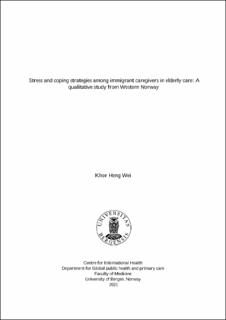Stress and coping strategies among immigrant caregivers in elderly care: A qualitative study from Western Norway
Master thesis
Permanent lenke
https://hdl.handle.net/11250/2759836Utgivelsesdato
2021-05-18Metadata
Vis full innførselSamlinger
- Master theses [135]
Sammendrag
Background: In the wake of an increasingly ageing population, the reliance on immigrant health workers has increased. Various studies have demonstrated that caregiving is stressful and that stress-related outcomes are especially high among this group. Aims: This study aimed to explore how immigrant health workers experience working in elderly care in western Norway. Methods: Data from thirteen immigrant caregivers was collected between March 2020 and August 2020, using semi-structured face-to-face interviews. Thematic network analysis was used to identify key themes that captured participant experiences. Job demands-resources theory was used in this thesis to further interpret participants’ experiences. Findings: Work stress was a major problem and was conceptualized by participants as closely related to language barriers, staffing problems, a strained relationship with patients, and poor cooperation with colleagues and superiors leading to various adverse work outcomes and poor work satisfaction. Participants highlighted a range of coping strategies which include maintaining a positive perspective, positive aspects of work and quitting as an alternative in which all these leads to their increased well-being. Conclusion: The findings extend current knowledge about immigrant caregivers’ work stress by identifying the challenges within their workplace and providing a basic understanding of how they deal with their daily work constraints. The findings outline how participants understood, managed and motivated themselves to cope with their daily work challenges, stay well and improve their overall job satisfaction in their work lives.
